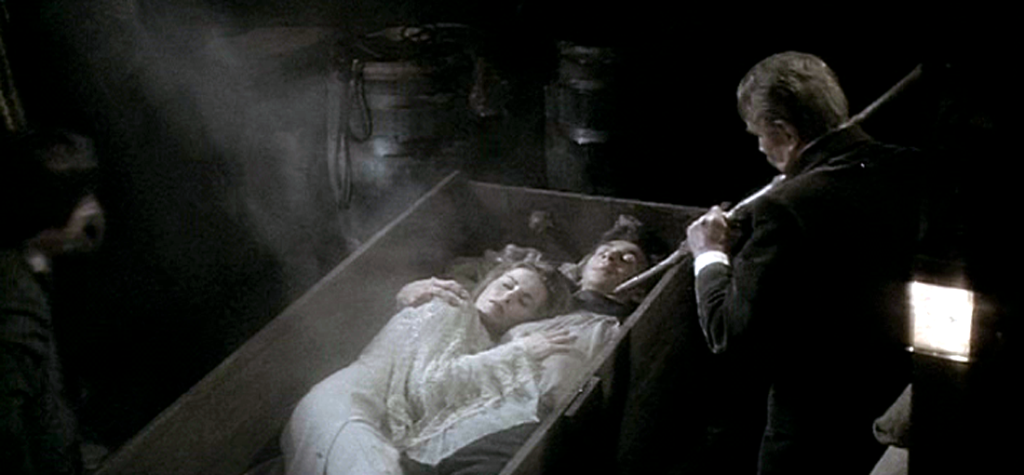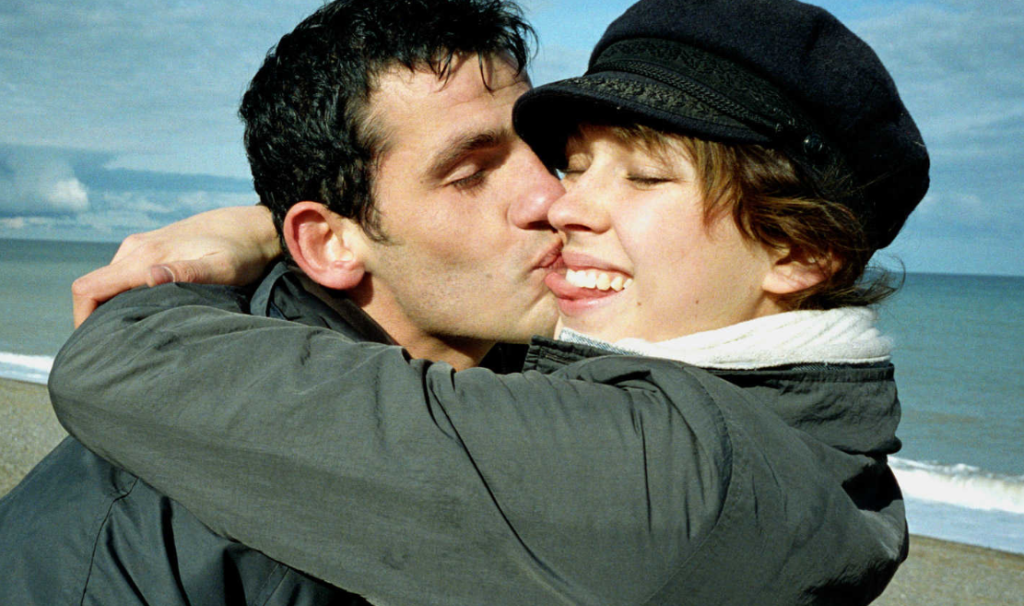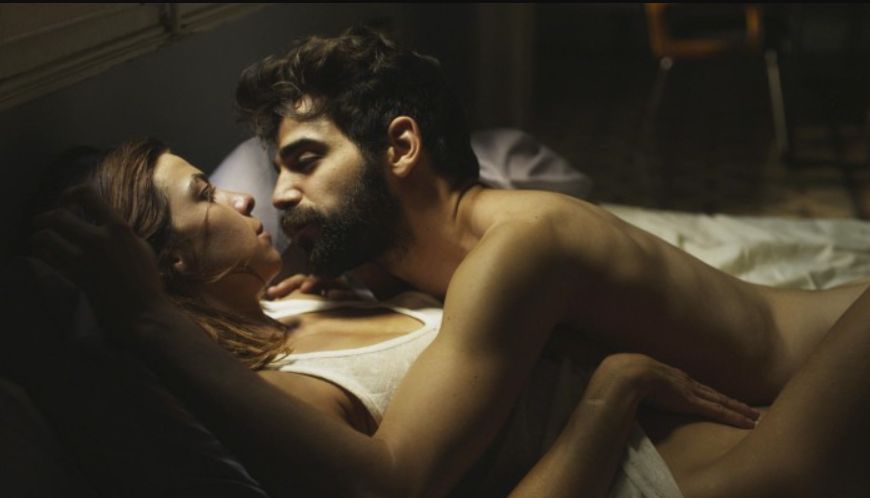If you’re a fan of steamy, seductive films, you may be interested in exploring some lesser-known titles that have flown under the radar. These 10 sexy films offer a tantalizing mix of romance, passion, and sensuality that are sure to keep you on the edge of your seat.
From forbidden love affairs to erotic encounters, these movies push the boundaries of traditional storytelling and offer a fresh perspective on the complexities of desire. So, if you’re looking to add a bit of spice to your movie night, consider checking out these hidden gems that will leave you craving more. With their captivating performances and steamy scenes, these films are sure to make a lasting impression on anyone who dares to take a chance on them.
Dracula (John Badham, 1979)
Dracula (John Badham, 1979) is a captivating and intense adaptation of Bram Stoker’s classic novel. The film follows the infamous vampire Count Dracula as he travels from Transylvania to England in search of fresh blood and new victims. Played by the charismatic Frank Langella, Dracula is portrayed as a seductive and enigmatic figure, luring his victims with his charm and supernatural powers.
The film is visually stunning, with elaborate sets and costumes that bring the gothic world of Dracula to life. The performances are equally impressive, with Langella delivering a chilling and mesmerizing portrayal of the iconic vampire. The film also explores themes of love, obsession, and the consequences of immortality, adding depth and complexity to the story. Overall, Dracula (John Badham, 1979) is a must-see for fans of horror and vampire films, offering a fresh and compelling take on the classic tale of the undead.

The Dreamers (Bernardo Bertolucci, 2003)
“The Dreamers” is a film directed by Bernardo Bertolucci in 2003 that tells the story of three young students in Paris during the political turmoil of May 1968. The trio, consisting of an American student named Matthew and French siblings Isabelle and Theo, form a close bond as they explore their shared love of cinema and intellectual pursuits.
Their relationship deepens as they immerse themselves in a world of fantasy and escapism, blurring the lines between reality and imagination. As their friendship blossoms, they challenge societal norms and question the status quo, pushing boundaries and seeking liberation from the constraints of their conservative upbringing. The characters’ passion for art and rebellion against authority create a sense of freedom and camaraderie that is both exhilarating and dangerous.
As the trio becomes increasingly entangled in their own desires and fantasies, they must confront the consequences of their actions and navigate the complexities of their relationships. “The Dreamers” is a visually stunning and thought-provoking film that explores the transformative power of friendship and the pursuit of personal freedom in a world that is constantly changing. Bertolucci’s masterful direction and the talented performances of the cast bring to life a story that is both captivating and challenging, inviting viewers to question their own beliefs and values.
The Big Easy (Jim McBride, 1986)
The Big Easy, directed by Jim McBride in 1986, is a film that delves into the murky world of corruption and crime in New Orleans. The story follows a charismatic and charming detective named Remy McSwain, played by Dennis Quaid, who is tasked with investigating a series of murders in the city.
As he delves deeper into the case, he uncovers a web of deceit and betrayal that threatens to engulf him. Along the way, he meets Anne Osborne, played by Ellen Barkin, a federal prosecutor who is determined to bring the perpetrators to justice. The chemistry between Remy and Anne is electric, adding a layer of tension and complexity to the already gripping narrative.
As the two work together to unravel the mystery, they must navigate the treacherous waters of New Orleans’ underworld, where loyalty is scarce and danger lurks around every corner. The Big Easy is a gripping and suspenseful thriller that offers a glimpse into the darker side of the city, where nothing is as it seems and trust is a rare commodity. With its stellar performances, stylish direction, and thrilling plot twists, The Big Easy is a must-see for fans of crime dramas and noir films.
Henry & June (Philip Kaufman, 1990)
Henry & June is a film directed by Philip Kaufman in 1990 that explores the complex and passionate relationship between writer Henry Miller and his wife June in 1930s Paris. The film delves into their tumultuous love affair, which is marked by intense emotional highs and lows as they navigate through their unconventional lifestyle. Henry, a struggling writer, is drawn to June’s free-spirited and uninhibited nature, while June is captivated by Henry’s raw talent and creative energy.
Their relationship is filled with passion, desire, and a sense of liberation that challenges societal norms and conventions. As they explore their sexuality and indulge in their desires, they find themselves caught in a web of emotions that push the boundaries of love and commitment.
The film portrays their relationship as a rollercoaster of emotions, with moments of intense intimacy and connection juxtaposed with periods of jealousy, betrayal, and heartbreak. Henry & June is a visually stunning and emotionally charged film that captures the essence of a love affair that defies societal expectations and norms. It is a story of love, passion, and self-discovery that challenges the boundaries of traditional relationships and explores the complexities of human emotions.

Secretary (Steven Shainberg, 2002)
Secretary is a film directed by Steven Shainberg that delves into the complex relationship between a boss and his secretary. The movie follows the story of Lee Holloway, a young woman who is hired as a secretary by lawyer E. Edward Grey. As Lee begins working for Mr. Grey, she quickly discovers that he has a penchant for controlling and manipulating her every move.
Despite his unconventional methods, Lee finds herself drawn to Mr. Grey and the power dynamic that exists between them. The film explores themes of dominance and submission, as well as the blurred lines between desire and control. As Lee and Mr. Grey navigate their complicated relationship, they both struggle to come to terms with their own desires and the consequences of their actions.
Through its provocative subject matter and nuanced performances, Secretary challenges viewers to question societal norms and the boundaries of power dynamics in relationships. Overall, the film offers a thought-provoking and unique take on the complexities of human connection and the ways in which individuals navigate their own desires and vulnerabilities.
Friday Night (Claire Denis, 2002)
In the film “Friday Night” directed by Claire Denis in 2002, the protagonist experiences a sense of freedom and recklessness as she embarks on a spontaneous encounter with a stranger on a Friday night in Paris. The night unfolds in a dreamlike sequence, as the woman finds herself in a car with a mysterious man she has just met. The city streets are bathed in a soft glow, adding to the surreal atmosphere of the night.
As they navigate the empty streets, a sense of intimacy and connection develops between the two characters, despite the fact that they are essentially strangers. The woman’s decision to abandon her plans and spend the night with this man represents a departure from her usual routine and a willingness to embrace the unknown. Through their interactions, the film explores themes of desire, loneliness, and the unpredictable nature of human connections.
The night becomes a transformative experience for the woman, as she navigates the complexities of her own desires and emotions. The film captures the fleeting and ephemeral nature of such encounters, highlighting the transient beauty of a single night in the city. “Friday Night” offers a poetic and atmospheric exploration of the ways in which chance encounters can alter the course of our lives, even if only for a brief moment in time.
9 Songs (Michael Winterbottom, 2004)
9 Songs, a film directed by Michael Winterbottom in 2004, is a controversial and explicit exploration of a tumultuous relationship between two young lovers. The film follows the couple as they attend nine live music concerts in London, with each performance serving as a backdrop for the progression of their intense and passionate relationship.
Through a series of graphic and unfiltered sex scenes, Winterbottom portrays the raw and unapologetic nature of their connection, highlighting the physical and emotional complexities that come with young love. The film pushes boundaries and challenges societal norms by depicting the couple’s intimacy in a candid and unfiltered manner, leaving viewers both captivated and unsettled by the intensity of their interactions.
Despite its provocative content, 9 Songs is also a poignant exploration of the highs and lows of love, capturing the fleeting moments of joy and the inevitable heartbreak that often accompany intense relationships. Winterbottom’s use of real concert footage adds an element of authenticity to the film, immersing viewers in the vibrant and chaotic world of live music while also providing a stark contrast to the intimate moments shared between the couple. Overall, 9 Songs is a thought-provoking and polarizing film that challenges viewers to confront their own beliefs and attitudes towards love, sex, and relationships.

Femme Fatale (Brian De Palma, 2002)
Femme Fatale, directed by Brian De Palma in 2002, tells the story of a seductive and mysterious woman named Laure Ash (played by Rebecca Romijn). Laure is a master of manipulation and deception, using her beauty and charm to get what she wants. Throughout the film, she is shown to be a complex character with a dark past and hidden motives. As the plot unfolds, it becomes clear that Laure is not to be trusted, as she is constantly playing a dangerous game of cat and mouse with those around her.
Her actions and decisions have unforeseen consequences that ultimately lead to a dramatic and thrilling climax. De Palma’s direction adds to the tension and suspense of the film, with his use of split screens, slow-motion sequences, and Hitchcockian influences creating a sense of unease and unpredictability.
Femme Fatale is a stylish and provocative thriller that explores themes of betrayal, revenge, and redemption, all wrapped up in a captivating and enigmatic narrative. Rebecca Romijn delivers a standout performance as the enigmatic Laure, embodying the femme fatale archetype with an alluring and captivating presence. Overall, Femme Fatale is a visually stunning and emotionally gripping film that keeps the audience on the edge of their seats from start to finish.
Weekend (Andrew Haigh, 2011)
“Weekend,” a 2011 film directed by Andrew Haigh, explores the intense connection that two men form over the course of a weekend. The story follows Russell, a lifeguard, and Glen, an artist, as they meet at a club and spend the next two days together. As the weekend progresses, the men open up to each other in ways they never have before, discussing their fears, dreams, and past experiences.
The film delves into their complex emotions and the challenges they face as they navigate their budding relationship. Through intimate conversations and shared moments, Russell and Glen discover a deep connection that transcends societal norms and expectations. The film challenges viewers to confront their own beliefs about love, identity, and intimacy, as Russell and Glen navigate the complexities of their evolving relationship.
“Weekend” offers a raw and authentic portrayal of two individuals grappling with their feelings and desires, ultimately questioning the boundaries that society places on love and connection. Haigh’s sensitive direction and the nuanced performances of the lead actors make “Weekend” a poignant and thought-provoking exploration of human connection and vulnerability.
As Russell and Glen navigate the ups and downs of their weekend together, they are forced to confront their own biases and preconceptions, ultimately leading to a deeper understanding of themselves and each other. Through its honest and heartfelt storytelling, “Weekend” challenges viewers to reconsider their own beliefs about love, intimacy, and the power of human connection.
10,000 Km (Carlos Marques-Marcet, 2014)
10,000 Km is a Spanish film directed by Carlos Marques-Marcet in 2014. The movie tells the story of a couple, Alex and Sergi, who are faced with the challenge of maintaining their long-distance relationship when Alex decides to move to Los Angeles for a year to pursue a photography career. The film explores the struggles and complexities of maintaining a relationship when separated by such a vast distance.
As the couple navigates their newfound challenges, they must confront their own insecurities, fears, and desires. The film highlights the power of love and the lengths people are willing to go to in order to make a relationship work, even when faced with seemingly insurmountable obstacles. Through intimate and raw performances by the lead actors, the audience is drawn into the emotional journey of the couple as they grapple with the realities of long-distance love.
10,000 Km is a poignant and realistic portrayal of the complexities of modern relationships and the sacrifices that individuals are willing to make in the name of love. The film’s nuanced exploration of the challenges of maintaining intimacy and connection across physical distance resonates with audiences who have experienced similar struggles in their own relationships. Ultimately, 10,000 Km is a moving and thought-provoking film that captures the highs and lows of love in the digital age.

The Watermelon Woman (Cheryl Dunye, 1996)
The Watermelon Woman is a groundbreaking film directed by Cheryl Dunye in 1996 that explores themes of identity, representation, and power dynamics within the film industry. The story follows a young black lesbian filmmaker named Cheryl who becomes obsessed with uncovering the history of an unknown black actress from the 1930s known only as “The Watermelon Woman.”
Through her research, Cheryl delves into the complexities of race, sexuality, and gender in Hollywood, shedding light on the erasure of black women from mainstream cinema. The film confronts the lack of diversity in film history and challenges the viewer to question who gets to tell stories and whose voices are prioritized in the industry.
Dunye’s film is a powerful commentary on the importance of representation and the ways in which marginalized communities have been silenced and sidelined in the media. By centering the experiences of a black lesbian protagonist, The Watermelon Woman disrupts traditional narratives and offers a much-needed perspective on the intersections of race, sexuality, and gender. Through its bold and unapologetic storytelling, the film serves as a reminder of the ongoing need for diverse voices and stories in cinema, and continues to inspire audiences to critically examine the power dynamics at play in the entertainment industry.
